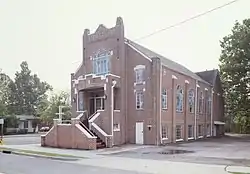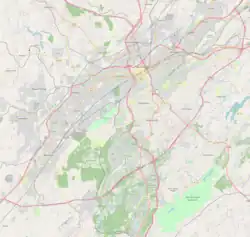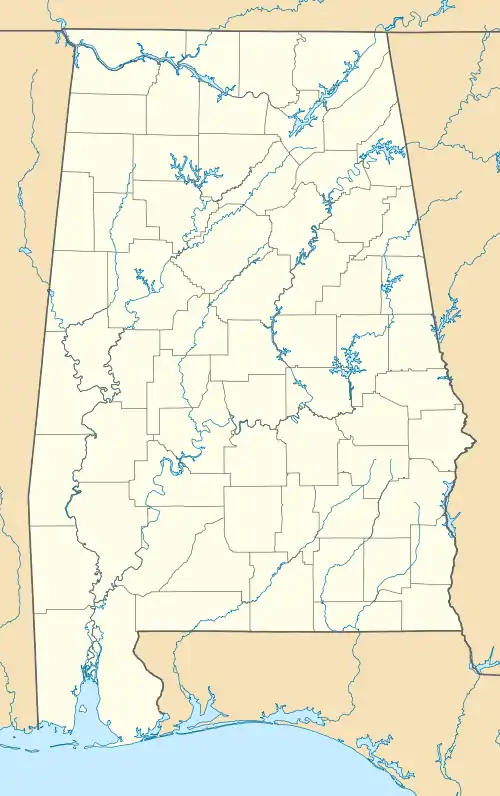Bethel Baptist Church (Birmingham, Alabama)
Bethel Baptist Church is a Baptist church in the Collegeville neighborhood of Birmingham, Alabama. The church served as headquarters from 1956 to 1961 for the Alabama Christian Movement for Human Rights (ACMHR), which was led by Fred Shuttlesworth and active in the Birmingham during the Civil Rights Movement. The ACMHR focused on legal and nonviolent direct action against segregated accommodations, transportation, schools and employment discrimination. It played a crucial role in the 1961 Freedom Rides that resulted in federal enforcement of U.S. Supreme Court and Interstate Commerce Commission rulings to desegregate public transportation.[2]
Bethel Baptist Church, Parsonage, and Guardhouse | |
 Bethel Baptist Church in 1993 | |
   | |
| Location | 3233, 3232 and 3236 29th Avenue North, Collegeville, Birmingham, Alabama |
|---|---|
| Coordinates | 33°33′06.5″N 86°48′07.3″W |
| Area | less than one acre |
| NRHP reference No. | 05000455 |
| Significant dates | |
| Added to NRHP | April 5, 2005[1] |
| Designated NHL | April 05, 2005[2] |
| Designated ARLH | November 13, 1996[3] |
History
The church's historic building is located near a newer, modern church. The historic church is located at the southwest corner of 29th Avenue North and 33rd Street North, and its parsonage and guard house located across 29th Avenue North. The church was built in 1926, and is an architecturally eclectic mix of Gothic and Renaissance styles. The guard house and parsonage are vernacular ranch-style houses; the parsonage was built in 1957 as a replacement for the previous parsonage, which had stood next to the church and was destroyed by a bomb in 1956.[4]
Fred Shuttlesworth served as pastor from 1953 to 1961. The church buildings were bombed on three separate occasions, first on December 25, 1956, again on June 29, 1958,[5] and lastly on December 14, 1962.[6][7][8]
The church's complex during the historic events of the 1950s and 1960s, located nearby on 29th Avenue North, was added to the Alabama Register of Landmarks and Heritage on November 13, 1996.[3] It was then added to the National Register of Historic Places and declared a National Historic Landmark on April 5, 2005.[2][1][9] On January 30, 2008, the US Government submitted it to UNESCO as part of an envisaged future World Heritage nomination (along with the Dexter Avenue Baptist Church and the 16th Street Baptist Church) and as such it is on the UNESCO 'Tentative List of World Heritage Sites'.[10]
In 1997, the church opened a new building near the historic site.[11]
In 2017, the church was included in the newly created Birmingham Civil Rights National Monument.
See also
References
- "National Register Information System". National Register of Historic Places. National Park Service. July 9, 2010.
- "Bethel Baptist Church, Parsonage, and Guard House". National Historic Landmarks Program. National Park Service. Archived from the original on April 3, 2008. Retrieved February 22, 2008.
- "Properties on the Alabama Register of Landmarks & Heritage". Alabama Historical Commission. www.preserveala.org. Archived from the original on September 4, 2012. Retrieved October 25, 2012.
- "NRHP/NHL nomination for Bethel Baptist Church". National Park Service. Retrieved November 28, 2019.
- In 1980 J. B. Stoner was convicted in connection with this bombing.
- "Bombing in Alabama Injures 5, Wrecks Negro Minister's Home". The New York Times. December 26, 1956. p. 1.
- "Bomb Attempt Fails; Volunteer Removes Dynamite From Birmingham Church". New York Times. June 30, 1958.
- Sitton, Claude (September 15, 1962). "Negroes Ask U.S. to Act in Third Bombing of Church". New York Times.
- "Bethel Baptist Church, Parsonage, and Guardhouse". National Historic Landmark Nomination. National Park Service.
- "Civil Rights Movement Sites". UNESCO World Heritage Convention, Tentative Lists. January 30, 2008. Retrieved December 6, 2016.
- Nathan Turner Jr., Black History: Bethel Baptist Church in Birmingham played key role in Civil Rights Movement, birminghamtimes.com, USA, February 2, 2017
External links
- Official website
- Bethel Baptist Church Collegeville website
- Historic American Buildings Survey (HABS) No. Al-977, "Bethel Baptist Church, 3233 Twenty-ninth Avenue, North, Birmingham, Jefferson County, AL", 13 photos, 1 color transparency, 3 measured drawings, 2 photo caption pages

